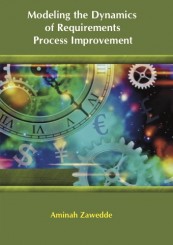Modeling the Dynamics of Requirements Process Improvement
Aminah Zawedde
Promotor: prof.dr. M.G.J. van den Brand (TU/e)
Copromotors: prof. D.W. Williams (KCAU) and dr.ir B. Walrave (TU/e)
Technische Universiteit Eindhoven
Date: 24 October, 2016, 16:00
Summary
A good number of software system process improvement organizations invest heavily in requirements process improvement (RPI) programs as a means of ensuring project success. However, most of these organizations fail to deliver the expected business value through returns on investment due to inefficient and ineffective RPI. RPI is a complex and dynamic domain which is characterized by many feedbacks and interrelated variables whose dynamics are difficult to demonstrate with traditional RPI methods. Modeling the dynamics and feedbacks that exist between these variables is key to improving our understanding and determining the best cost effective alternative for implementing RPI. The thesis examines the challenges of RPI using a system dynamics based modeling approach. System Dynamics is suitable for modeling these complex and dynamic problems from a feedback viewpoint that are characteristics of RPI.
First the research identified the characteristics of a potential model for RPI based on the shortcomings of the existing methods that were obtained through literature and field studies. Secondly, key variables for RPI were determined and the extent to which they predict RPI success. Better understanding and insights were gained through the development of a system dynamics model to aid explanation of the dynamics of RPI, while objectively achieving cost effective decisions for process improvement. These problems were investigated through the application of the Dynamics Synthesis Methodology (DSM) that integrates system dynamics modeling and case study approaches. The resulting simulations indicate that key variables that determine the success of RPI for small to medium sized projects include errors observed, productivity of the requirements engineers, process improvement costs, customer satisfaction, process rigor, and management commitment. The success of requirements process improvement in view of high quality requirements specification, delivered in time and within the specified budget is key in attaining positive returns on investment for organizations that carry out process improvement. Two aspects of RPI were modeled; the dynamics of RPI that results into failed RPI projects and the dynamics of RPI that yields possibilities of RPI success. A comprehensive model is developed that management can apply to conduct explorative interventions which can result in fundamental solutions for RPI.
The model developed was validated by RPI experts based on their industrial experiences and best practices, as a tool for RPI. RPI researchers and managers may use the model as a tool to carry out “what-if” analyzes that may improve their understanding and foster communication among the RPI stakeholders. The model developed constitutes novel scientific knowledge about RPI and improves our understanding of the RPI process and its outcomes. The RPI model also provides a basis for dynamic planning and control through information visualization of the simulation results. Project managers and researchers can use the RPI model for decision making.